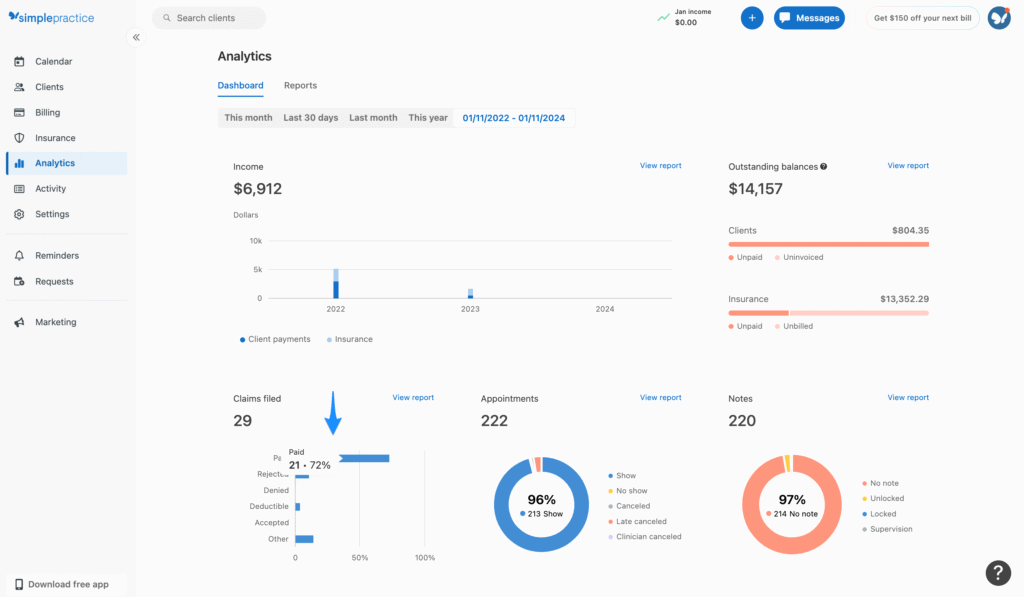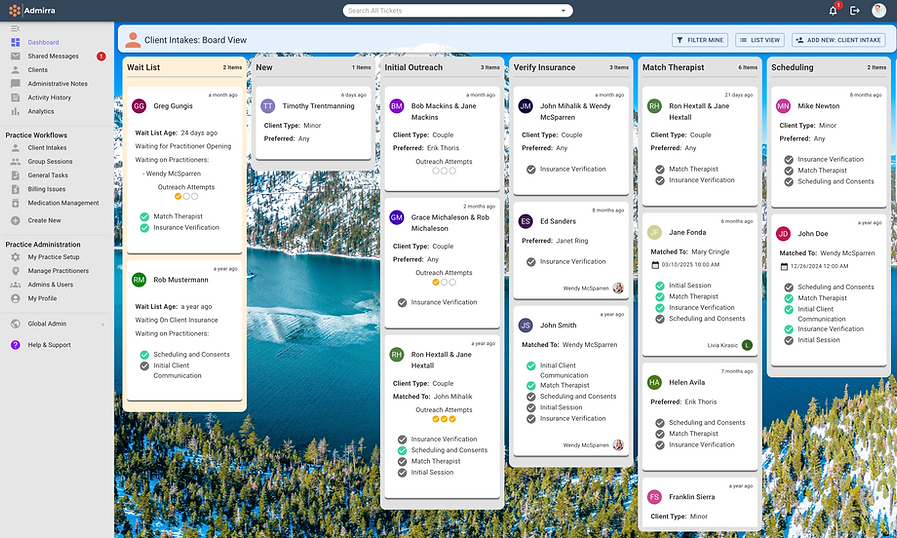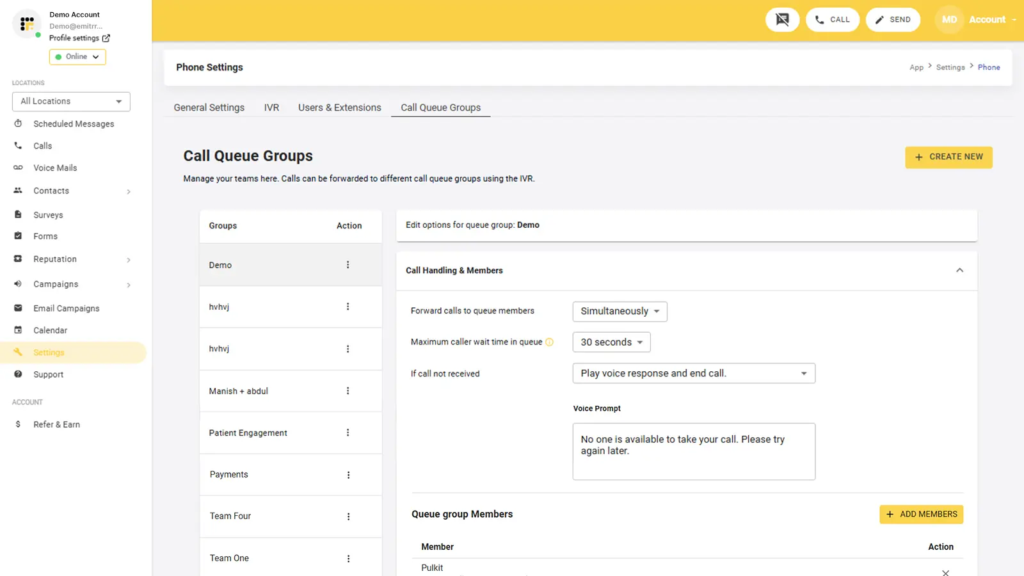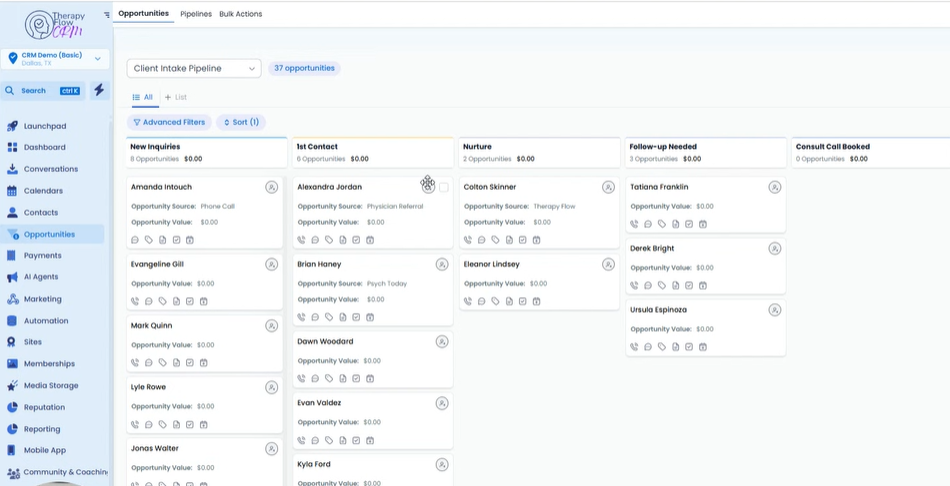- Home
- Learn
- Healthcare
- Best CRM for therapists in 2026
HEALTHCARE
Best CRM for therapists in 2026
Contents
Running a therapy practice involves a lot more than just attending to clients.
Between managing schedules and keeping paperwork organized, the administrative side of therapy can take up a surprising amount of time.
That’s where a CRM (short for Customer Relationship Management system) can really help therapists. In simple terms, a CRM is software that keeps all your client and practice information in one place. Instead of switching between spreadsheets, email threads, calendars, and notes, a CRM helps you keep everything connected and easy to find (be it appointment details, session notes, or follow-up data)
But not all CRMs are the same. Most business CRMs are built for sales teams, not therapists.
A therapist-focused CRM, on the other hand, caters to the unique needs of mental health practices. It helps with things like client intake, appointment scheduling, sending automated appointment reminders, secure communication and more — all while following privacy laws like HIPAA.
In this article, we’ll break down what features matter most in a CRM for therapists and highlight the best options available in 2026, so you can find one that fits the way you work and makes managing your practice easier.
Here are some clear signs it might be time to start using a CRM for your therapy practice:
If you’re bouncing between your inbox, calendar, and spreadsheets to track appointments and follow-ups, it’s easy to lose important information. A CRM brings everything together (from client history to messages and forms) so your team can see what’s happening in one place.
Paper or PDF forms make onboarding new clients a chore. A CRM lets clients complete secure digital forms before their first session, automatically adding their details to your records and saving hours of admin work.
3. Missed or delayed follow-ups
When inquiries start piling up, it’s easy to miss attending to some. A CRM keeps track of every message, call, or form submission, and can automate responses or reminders, so no one is forgotten.
Potential clients don’t always reach out during business hours. Without an automated system, many of those leads are lost. A CRM can text back missed calls, collect details, and start the intake process even while you’re offline.
If clients forget their appointments or cancel too late, it affects both scheduling and income. With automated reminders and easy rescheduling options, a CRM helps reduce no-shows and keeps your calendar full.
Therapy notes might live in your EHR, but texts and emails are often stored elsewhere. A CRM consolidates non-clinical interactions, giving you full context whenever you need it.
Sometimes clients take a break from therapy and don’t return simply because they forget. A CRM can help you check in periodically, share updates, or send a friendly reminder — keeping your practice top of mind.
Without structured tracking, it’s hard to see which months are slow or what outreach works best. CRMs offer built-in analytics, so you can measure things like patient retention, response rates, and appointment trends without digging through spreadsheets.
Here are the main features to look for in therapist-focused CRMs:
A therapist CRM acts as a single, organized database for your clients. It securely stores contact details, intake forms, therapy notes, and session history. Having this information in one place makes it easy to review progress and prepare for upcoming appointments, especially when working with returning clients.
Missed or forgotten appointments can disrupt both your schedule and your clients’ progress. A CRM with built-in scheduling lets clients book or reschedule appointments online and automatically sends reminders via text or email. This simple automation helps reduce no-shows and ensures that sessions run on time.
Therapists often juggle session fees, insurance claims, and payment tracking manually. A CRM that includes billing tools can simplify this by creating invoices, recording payments, and even processing credit card or insurance payments securely — saving time and reducing administrative errors.
Because therapy involves sensitive personal information, data security is crucial. Look for a CRM that complies with privacy regulations such as HIPAA (in the U.S.) or equivalent standards elsewhere. This means the system encrypts data, controls who can access it, and maintains audit logs to ensure confidentiality is never compromised.
Every practice involves routine tasks like sending intake forms, collecting feedback, or reminding clients about upcoming sessions. Automation allows these repetitive steps to happen automatically.
A good CRM should fit smoothly into your existing setup. It should connect with your calendar, telehealth software, and your electronic health record (EHR) if you use one. This reduces the need to enter the same data multiple times and keeps everything synchronized.
Beyond day-to-day management, CRMs can help you see the bigger picture. Built-in reports can show trends such as client retention rates, session frequency, and revenue patterns. These insights help you understand what’s working well and where your practice can improve.
Therapist CRMs aren’t just for large practices or tech-savvy clinics. Here’s who benefits most and how they use these systems day to day:
Independent therapists often have to handle everything themselves: scheduling, paperwork, billing, and client communication. A CRM helps them keep all of this in one place, so they don’t need to switch between spreadsheets or calendars.
When multiple therapists work under the same roof, it becomes important to coordinate schedules, share client updates (when appropriate), and ensure everyone follows the same process. A CRM gives the team a shared system where client information and progress notes stay consistent and easy to find.
Larger clinics often manage dozens of clients across various programs. They use CRMs to track referrals, manage client intake forms, monitor session progress, and handle billing. This reduces manual data entry and helps teams stay on top of follow-ups or treatment milestones.
For therapists who see clients virtually, a CRM can act as the central hub for scheduling, video links, and secure client communication. Many systems also store signed consent forms and session notes digitally, so everything stays compliant with HIPAA regulations and is easy to access.
| CRM for therapist | Best features | Rating (from G2) | Pricing |
| LeadSquared | Automates intake and scheduling workflows, uses AI voice assistant to handle calls and bookings, integrates with EHR and telehealth platforms | 4.5/5 | Pro – $60/user/month Super – $100/user/month |
| SimplePractice | Offers built-in telehealth for secure sessions, automates reminders and online scheduling, includes integrated billing and insurance tools | 4.1/5 | Starter – $49/month Essential – $79/month Plus – $99/month |
| Admirra | Centralizes intake and referral management, provides analytics and reporting dashboards, supports collaboration across multi-provider teams | N/A | Starter – $299/month Medium – $499/month Large – $699/month Enterprise – Custom |
| Emitrr | Automates text reminders and confirmations, captures missed calls and starts intake automatically, includes AI receptionist for client communication | 4.8 | Modular pricing based on plan and message volume |
| Therapy Flow | Supports two-way text messaging and missed-call textbacks, automates intake and email workflows, includes marketing and referral management tools | N/A | Basic communication – $69/month Pro tool kit – $197/month |
H2: The 5 best CRMs for therapists in 2026
LeadSquared’s AI-powered HIPAA-compliant CRM is built to make the administrative side of therapy easier to manage. This CRM for therapists supports workflows like client intake, scheduling, referral management, and secure communication, while robust automation tools pull the strings in the background. It also integrates with your EHR and telehealth platforms to keep records and client updates connected in one place.
One user shared that LeadSquared does an excellent job of capturing and organizing inquiries from different sources into one central system.
One user shared that while the system works well overall, minor syncing delays occasionally slow down real-time tracking.
Best for: Therapy and behavioral health practices of any size that need deep intake automation, secure client communications, and EHR/telehealth integration while maintaining complete HIPAA compliance.

SimplePractice is a widely used CRM and practice management system for therapists. It’s designed specifically for mental health professionals and offers the tools you need to manage your day-to-day work — from appointment scheduling and secure documentation to telehealth and billing.
One user mentioned that the system was very easy to set up and straightforward to use, making it simple to get started without much guidance.
One user said the base package didn’t offer enough value, as it lacked important tools like appointment syncing, secure client messaging, and billing features.
Best for: Solo and small group therapy practices that need an all-in-one tool for scheduling, billing, and telehealth.

Admirra is a HIPAA-compliant CRM built specifically for mental health and behavioral health practices. It focuses on intake, client communication, practice-wide collaboration, and reporting. The product is positioned for group practices and clinics that need a centralized way to manage referrals, run benefit checks, coordinate multiple providers, and automate routine outreach.
Best for: Mid to large-sized therapy practices or multi-provider clinics that need an integrated system for client intake, scheduling, therapist coordination, and analytics.

Emitrr is an AI-powered communications platform that many therapy and behavioral health practices use to automate client outreach and manage messaging. The product is designed to work with existing phone numbers and to integrate with scheduling or EHR systems so messages and appointment details stay in sync.
A user shared that Emitrr’s support team was responsive and that the platform’s texting and web-bot features worked smoothly across desktop and mobile.
One user mentioned that the system occasionally runs a bit slow for their team.
Emitrr offers modular plans. Pricing depends on the package and message volumes.
Best for: Small to mid-sized therapy practices that want to automate client communications (texts, missed calls, reminders) and capture leads efficiently—especially practices that don’t yet have a large in-house admin team or complex documentation workflows.

Therapy Flow offers a combined CRM, marketing, and practice-growth service aimed at mental health practices. The platform includes client intake forms, two-way text messaging, automated workflows, and more, to help practices attract and manage clients.
Best for: Small to mid-size practices and private clinics that want a combined CRM plus marketing tool to grow their client base.
Therapist CRMs have become more than just convenience—they’re now an essential part of running an organized, professional practice. Throughout this article, we’ve looked at what they do, which features matter most, and which platforms are worth exploring.
A reliable CRM can help you reduce no-shows, simplify your documentation, and improve the overall client experience. For busy therapists, that means less time spent managing logistics and more time supporting clients.
LeadSquared brings these capabilities together in a HIPAA-compliant, automation-ready system built to adapt to your needs. If you’re curious to see what difference it can make, scheduling a short demo is an easy next step.
Yes, you can, but you may not get everything you need. Generic CRMs are made for sales or general business tasks and may lack features like secure client notes, therapy-specific intake forms, or HIPAA-compliant communication. A therapy-focused CRM adds tools built around client sessions, reminders, and sensitive data handling.
It depends on the size of your practice and how many features you want to use. For a solo therapist using basic scheduling and reminders, it could be a few days. If you have multiple therapists, custom forms, and integrations (billing, telehealth, EHR), it might take a few weeks. The key is to start small and gradually expand.
Absolutely. Many therapist-CRMs let you tag or record the referral source (website inquiry, social media, word of mouth). Over time, this helps you see which channels bring in the most clients and invest more wisely in outreach. This kind of tracking helps grow your practice built on data, not guesswork.
When switching CRMs, you’ll want to be certain your new system allows secure import or migration of existing notes and records. Because therapy notes are sensitive, you should choose a CRM that is compliant with privacy rules (for example HIPAA in the U.S.). Make sure the vendor offers safe data transfer and clear support for moving historical records.
Not if used thoughtfully. A CRM adopted well can actually improve client experience: automatic reminders reduce missed appointments, secure messaging helps smooth communication, and client histories are easier to access. All of this frees you to spend more time focusing on the person in front of you rather than chasing paperwork. The technology supports your work, rather than replacing the human side.
The best CRM for tracking therapist performance and retention is one that combines data tracking, automation, and compliance features in a way that fits how behavioral health practices work.
LeadSquared Healthcare CRM stands out here because it’s designed for healthcare and behavioral health settings. It lets you:
Track therapist performance through metrics like session counts, cancellations, utilization rates, and client retention.
Set measurable goals for each therapist and monitor progress through easy dashboards.
Automate routine actions like client reminders, post-session follow-ups, and check-ins—helping improve retention without adding admin work.
Maintain HIPAA compliance and role-based access so that sensitive patient data stays protected.
Other CRMs like Emitrr, Pipedrive, or TheraSaaS can also help with communication and tracking.
If your goal is to monitor how therapists perform and keep clients engaged over time, LeadSquared Healthcare CRM provides the best balance of reporting, automation, and compliance features tailored for behavioral health practices.